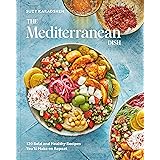The Mediterranean diet stands out as more than just a passing dietary trend; it represents a deeply rooted, scientifically validated eating pattern that consistently earns top recommendations from global health organizations and medical professionals. As explored in the insightful video above, this approach to nutrition is not merely a diet but a comprehensive lifestyle, drawing its wisdom from the traditional eating habits of countries bordering the Mediterranean Sea. Far from being a restrictive regimen, it emphasizes a balanced intake of whole, unprocessed foods, demonstrating remarkable efficacy in promoting long-term health and well-being.
For individuals seeking a sustainable, evidence-based pathway to superior health, understanding the nuances of the Mediterranean diet offers profound advantages. This dietary pattern, unlike many fleeting fads, is supported by decades of rigorous research, highlighting its protective effects against a spectrum of chronic diseases and its capacity to enhance overall quality of life. Embracing these principles can transform daily eating into a powerful tool for disease prevention and vitality.
Understanding the Enduring Principles of the Mediterranean Diet
Originating from regions like Greece, Italy, and Spain, the Mediterranean diet is fundamentally characterized by a focus on fresh, seasonal ingredients and a mindful approach to eating. Its historical resilience reflects a diet deeply intertwined with cultural practices, emphasizing culinary enjoyment and social connection alongside nutritional benefits. This pattern is not prescriptive in a rigid sense but offers flexible guidelines for optimizing health outcomes.
Historically, inhabitants of these regions exhibited significantly lower rates of cardiovascular disease, certain cancers, and metabolic disorders compared to populations adhering to typical Western diets. This epidemiological evidence forms the bedrock of its current scientific recognition. The diet’s cornerstone is a high intake of plant-based foods, healthy fats, and fish, while red meat and processed foods are consumed sparingly.
Core Nutritional Pillars of the Mediterranean Diet
At its heart, the Mediterranean diet revolves around several distinct nutritional components, each contributing synergistically to its health-promoting profile. These pillars provide essential macronutrients and micronutrients, supporting bodily functions and mitigating inflammation. A closer examination reveals why this approach is so potent.
-
Abundant Plant-Based Foods: A daily emphasis on vegetables, fruits, whole grains, and legumes provides a rich supply of fiber, vitamins, minerals, and potent antioxidants. These components are crucial for digestive health, blood sugar regulation, and combating oxidative stress.
-
Prioritizing Healthy Fats: Extra virgin olive oil is the signature fat of the Mediterranean diet, offering monounsaturated fatty acids (MUFAs) and polyphenols that are cardio-protective. Avocados, nuts, and seeds further contribute beneficial unsaturated fats, actively reducing systemic inflammation.
-
Regular Fish Consumption: Fatty fish such as salmon, mackerel, and sardines are consumed several times a week, providing generous doses of omega-3 fatty acids. These essential fats are critical for brain health, reducing inflammation, and supporting cardiovascular function.
-
Moderate Dairy and Poultry: Dairy products, particularly fermented varieties like yogurt and cheese, are consumed in moderation, often in lower-fat forms. Poultry is also included but less frequently than fish, serving as a leaner protein source.
-
Limited Red Meat and Processed Foods: Red meat consumption is infrequent, typically reserved for special occasions, and highly processed foods, sugary drinks, and unhealthy saturated and trans fats are largely avoided. This restriction minimizes intake of pro-inflammatory compounds and excessive caloric density.
Beyond Food: The Mediterranean Lifestyle
Crucially, the Mediterranean diet extends beyond mere food choices, encompassing a holistic lifestyle that profoundly impacts health. This integrated approach highlights the interconnectedness of diet, physical activity, and social well-being. These lifestyle factors are equally instrumental in achieving its acclaimed health benefits.
Regular physical activity, often integrated into daily routines through walking, gardening, or cycling, is a cornerstone of this lifestyle. Moreover, the emphasis on social eating, sharing meals with family and friends, fosters community and reduces stress, contributing positively to mental health. This communal aspect not only enhances mealtime enjoyment but also contributes to slower, more mindful eating habits.
Scientific Validation: Unpacking the Health Benefits of the Mediterranean Diet
The sustained popularity of the Mediterranean diet is primarily due to its robust scientific backing, with extensive research elucidating its profound effects on various health markers. Hundreds of studies, including large-scale epidemiological investigations and randomized controlled trials, consistently affirm its efficacy. These findings underscore its role as a powerful preventative and therapeutic dietary intervention.
The scientific community, including organizations like the World Health Organization (WHO) and major cardiology associations, widely endorses this eating pattern. They recognize its comprehensive benefits, which span from cardiovascular protection to cognitive preservation. This strong consensus validates its positioning as a gold standard for healthy eating.
Cardiovascular Protection
Perhaps the most celebrated benefit of the Mediterranean diet is its unparalleled impact on cardiovascular health. Decades of research, including landmark studies such as the PREDIMED trial, have demonstrated its ability to significantly reduce the risk of major adverse cardiovascular events. The diet actively modulates several key risk factors for heart disease.
Specifically, it has been shown to lower low-density lipoprotein (LDL) cholesterol, often termed “bad” cholesterol, while simultaneously increasing high-density lipoprotein (HDL) cholesterol, or “good” cholesterol. Furthermore, its anti-inflammatory properties and beneficial effects on endothelial function contribute to a substantial reduction in the incidence of myocardial infarction (heart attack) and stroke, often by as much as 30% in high-risk individuals. The rich content of MUFAs, omega-3s, and antioxidants collectively supports arterial health and reduces atherosclerotic plaque formation.
Metabolic Health and Diabetes Management
The high fiber content from whole grains, legumes, fruits, and vegetables in the Mediterranean diet plays a pivotal role in regulating blood glucose levels. This effectively blunts post-prandial glucose spikes, thereby reducing the insulin load and improving insulin sensitivity. This mechanism is critical for preventing and managing type 2 diabetes.
Longitudinal studies indicate that adherence to the Mediterranean diet can lower the risk of developing type 2 diabetes by 20-25% and significantly improve glycemic control in those already diagnosed. Its contribution to stable blood sugar also helps mitigate the risk of developing metabolic syndrome, a cluster of conditions that includes high blood pressure, high blood sugar, excess body fat around the waist, and abnormal cholesterol levels.
Cognitive Resilience
Emerging research increasingly highlights the neuroprotective effects of the Mediterranean diet, linking it to enhanced cognitive function and a reduced risk of neurodegenerative diseases like Alzheimer’s. The abundant antioxidants from olive oil and plant foods combat oxidative stress in the brain, while omega-3 fatty acids from fish are essential for neuronal membrane health and synaptic plasticity.
These dietary components collectively reduce neuroinflammation and support optimal cerebral blood flow, crucial factors in maintaining cognitive acuity throughout the lifespan. Studies consistently demonstrate better memory, improved executive function, and a slower rate of cognitive decline among adherents. This makes it a formidable strategy for long-term brain health.
Sustainable Weight Management
Unlike many restrictive diets that promote rapid but unsustainable weight loss, the Mediterranean diet offers a more holistic and enduring approach to weight management. Its emphasis on fiber-rich foods promotes satiety, reducing the likelihood of overeating and mindless snacking. This natural regulation of appetite avoids the typical yo-yo dieting cycle.
By focusing on nutrient-dense, whole foods, it naturally lowers the caloric density of meals while increasing nutrient intake. This combination supports a healthy metabolism and encourages gradual, sustainable weight loss or maintenance, without requiring stringent calorie counting or food group elimination. The inclusion of healthy fats further enhances satiety and nutrient absorption.
Enhanced Longevity and Quality of Life
Beyond preventing specific diseases, adherence to the Mediterranean diet is consistently associated with greater longevity and an improved quality of life into old age. Studies conducted in regions such as Ikaria, Greece, and Sardinia, Italy—designated “Blue Zones” known for exceptional longevity—underscore this connection. These populations not only live longer but also experience fewer chronic illnesses and maintain higher levels of physical and cognitive function.
The cumulative effects of reduced inflammation, improved cardiovascular and metabolic health, and cognitive preservation all contribute to a healthier, more active senior life. This broad spectrum of benefits solidifies the Mediterranean diet’s position as a blueprint for healthful aging. It enables individuals to enjoy more vibrant, active years.
Adaptability and Sustainability: A Diet for Everyone
One of the Mediterranean diet’s greatest strengths lies in its inherent flexibility and adaptability, making it suitable for a diverse range of cultures and dietary preferences. It is not an “extreme” diet with harsh restrictions, but rather a balanced and sustainable eating pattern that provides all essential nutrients without causing stress or deprivation. This inherent flexibility distinguishes it from many other dietary approaches.
This adaptability means that individuals can integrate its core principles using locally available ingredients, adjusting for personal tastes and budgets. For example, specific Mediterranean fish can be replaced with other omega-3 rich options like salmon or even freshwater varieties, and expensive olive oil can be supplemented with other healthy oils. The key is to focus on the *principles* of plant-heavy, healthy fats, lean proteins, and whole grains, rather than a rigid adherence to specific Mediterranean foodstuffs.
Practical Integration: Bringing the Mediterranean Diet Home
Adopting the Mediterranean diet does not require a complete overhaul of one’s pantry or a strict adherence to traditional Mediterranean recipes. Instead, it involves making conscious, gradual shifts towards a more plant-centric, whole-foods approach. This incremental adoption enhances the likelihood of long-term success and enjoyment. Small, consistent changes yield significant health dividends over time.
Begin by increasing your intake of seasonal vegetables and fruits, making them the star of your meals. Incorporate legumes like lentils and chickpeas into soups, stews, and salads, and swap refined grains for whole grains like brown rice, oats, or whole wheat pasta. Furthermore, replace butter and animal fats with extra virgin olive oil as your primary cooking fat, and aim for at least two servings of fatty fish per week.
Additionally, prioritize lean protein sources and limit red meat to occasional consumption, perhaps once or twice a month. Remember to view food as nourishment and a source of enjoyment, rather than a rigid set of rules. Incorporating social aspects, such as cooking with family or enjoying meals with friends, reinforces the holistic benefits of the Mediterranean diet.











